Stock Market Massive Insider Selling, End of the Rally?
Stock-Markets / Financial Markets 2009 Jul 25, 2009 - 01:50 AM GMT Execs at big banks aren’t worried about their paycheck.
Execs at big banks aren’t worried about their paycheck.
JPMorgan Chase & Co., the second- largest U.S. bank by assets, will increase salaries for investment bankers, mirroring similar steps taken by rivals, a person familiar with the firm said.
The plan affects those who earn half or more of their total compensation in year-end bonuses, the person said, declining to be identified because pay matters are confidential. It will be implemented in 2010, after details are announced at the end of this year. The bankers’ total pay won’t change because bonuses will be lowered.
Consumers less confident.
Confidence among U.S. consumers fell in July for the first time in five months as mounting unemployment and depressed wages shook households. The Reuters/University of Michigan final index of consumer sentiment decreased to 66, in line with forecasts, from 70.8 in June. A preliminary reading was 64.6.
The biggest employment slump of any recession in the last eight decades may be making more Americans feel their jobs are in jeopardy. The growing insecurity, together with falling home values, is prompting households to limit spending and save more, meaning an economic recovery will take time to gain speed.
Many economists believe that when the economy finally bottoms out it won’t bounce back up, but enter a period of slow growth and a long slow recovery. The trillions of dollars in lost asset values are not likely to recover quickly; those who are waiting for a quick return to old spending habits may be disappointed. The consumer economy is being swiftly replaced by a new era in which people are spending less and saving more.
Analyst sees “Massive Insider Selling.”
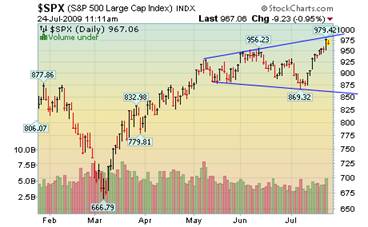 --Charles Biderman, CEO of TrimTabs Investment Research, says the rally from the March lows is going to end soon, if it hasn't already. His rationale is based on a complex analysis of a very simple thing, supply and demand. Since the start of May, there have been $98.5 billion of secondary stock offerings (most notably by banks). At the same time, there's been "massive selling" by insiders, to the tune of $3.9 billion vs. just $350 million of insider buying.
--Charles Biderman, CEO of TrimTabs Investment Research, says the rally from the March lows is going to end soon, if it hasn't already. His rationale is based on a complex analysis of a very simple thing, supply and demand. Since the start of May, there have been $98.5 billion of secondary stock offerings (most notably by banks). At the same time, there's been "massive selling" by insiders, to the tune of $3.9 billion vs. just $350 million of insider buying.
Treasury bonds slipping more. When will it stop?
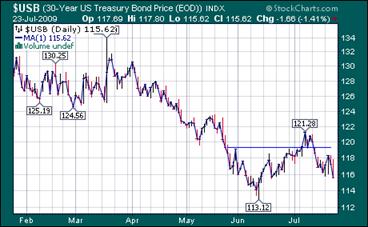 -- Treasuries were little changed, pausing a two-day decline, before a report that economists said will show U.S. consumer confidence fell to the lowest level since March. Notes gained initially amid speculation yields are high enough to lure investors to a record $115 billion in debt sales next week, with benchmark 10-year rates near the most in a month. President Barack Obama is borrowing unprecedented amounts to try to halt the steepest U.S. economic recession in 50 years, raising concern benefits from stimulus spending won’t last.
-- Treasuries were little changed, pausing a two-day decline, before a report that economists said will show U.S. consumer confidence fell to the lowest level since March. Notes gained initially amid speculation yields are high enough to lure investors to a record $115 billion in debt sales next week, with benchmark 10-year rates near the most in a month. President Barack Obama is borrowing unprecedented amounts to try to halt the steepest U.S. economic recession in 50 years, raising concern benefits from stimulus spending won’t last.
Analysts say rising gold prices dependent on falling dollar.
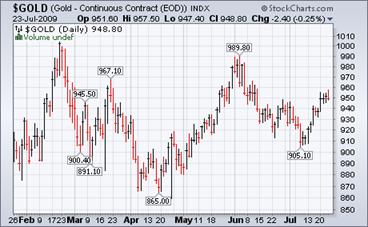 Gold, little changed today in New York and London, may rise on speculation a drop in the dollar will spur demand for the metal as an alternative investment. Bullion for immediate delivery has added 1.5 percent this week, heading for a second weekly climb, as the dollar has dropped against the euro. The metal surged to an 11-month high in February as investors sought to protect their wealth during the worst global recession since World War II.
Gold, little changed today in New York and London, may rise on speculation a drop in the dollar will spur demand for the metal as an alternative investment. Bullion for immediate delivery has added 1.5 percent this week, heading for a second weekly climb, as the dollar has dropped against the euro. The metal surged to an 11-month high in February as investors sought to protect their wealth during the worst global recession since World War II.
The Nikkei takes a break from the decline.
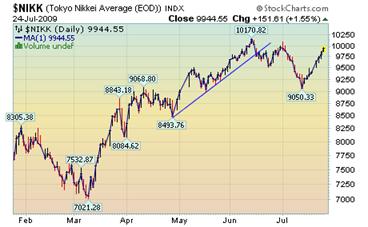 -- Japanese stocks climbed, lifting the Nikkei 225 Stock Average for an eighth day, as the earnings outlooks for Panasonic Corp. and Fujitsu Ltd. and rising U.S. home sales buoyed investor confidence in an economic recovery. But it appears that commodities and equities are all acting from the same playbook, both here in the United States and overseas. Should liquidity decrease, the outcome may be severe.
-- Japanese stocks climbed, lifting the Nikkei 225 Stock Average for an eighth day, as the earnings outlooks for Panasonic Corp. and Fujitsu Ltd. and rising U.S. home sales buoyed investor confidence in an economic recovery. But it appears that commodities and equities are all acting from the same playbook, both here in the United States and overseas. Should liquidity decrease, the outcome may be severe.
Nobody seems worried about the Chinese economy.
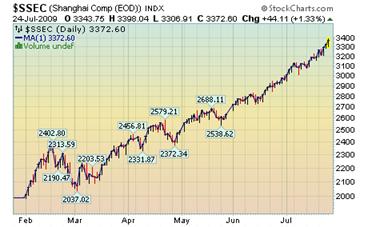 -- China’s benchmark stock index rose, capping its biggest weekly gain since May, as energy producers rallied on optimism recovery in the world’s third-largest economy will boost demand for fuel. The Shanghai Composite Index rose 5.7 percent this week, the most since the period to May 8, as the government signaled it will allow more money to pump into the financial system to cement economic growth.
-- China’s benchmark stock index rose, capping its biggest weekly gain since May, as energy producers rallied on optimism recovery in the world’s third-largest economy will boost demand for fuel. The Shanghai Composite Index rose 5.7 percent this week, the most since the period to May 8, as the government signaled it will allow more money to pump into the financial system to cement economic growth.
The dollar is shunned in favor of risk.
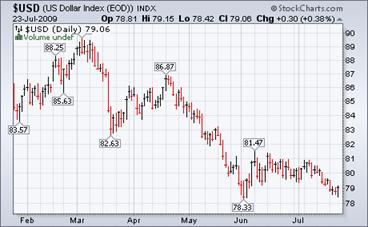 -- The dollar slipped against the euro on Friday as figures showing a stabilizing euro zone economy supported expectations for a global recovery this year, stoking risk appetite. Solid (“less bad”) corporate earnings have boosted risk trades this week, but some companies have shown weak results and a strong performance for the last quarter may not point to strength in the future.
-- The dollar slipped against the euro on Friday as figures showing a stabilizing euro zone economy supported expectations for a global recovery this year, stoking risk appetite. Solid (“less bad”) corporate earnings have boosted risk trades this week, but some companies have shown weak results and a strong performance for the last quarter may not point to strength in the future.
Commercial property at risk.
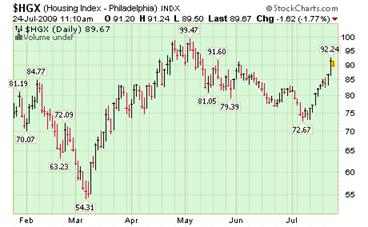 Federal Reserve Chairman Ben S. Bernanke said a potential wave of defaults in commercial real estate may present a “difficult” challenge for the economy, without committing to additional steps to aid the market. It “may be appropriate” for the government and Congress to consider “fiscal” steps to support the industry, Bernanke said today. Ideas for fresh support for the market could include government guarantees for commercial mortgages.
Federal Reserve Chairman Ben S. Bernanke said a potential wave of defaults in commercial real estate may present a “difficult” challenge for the economy, without committing to additional steps to aid the market. It “may be appropriate” for the government and Congress to consider “fiscal” steps to support the industry, Bernanke said today. Ideas for fresh support for the market could include government guarantees for commercial mortgages.
Gasoline prices rally with the other markets.
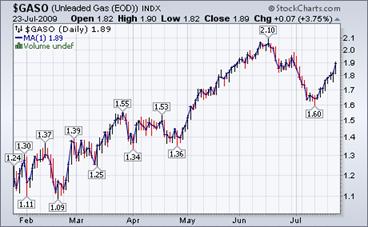 Someone fell asleep at the Energy Information Administration. Their Weekly Report suggests that, “For the fourth consecutive week, the U.S. average price for regular gasoline fell, dropping about seven cents to $2.46 per gallon. The national average price has tumbled a total of nearly 23 cents over those four weeks, to bring the price to $1.60 below last year.” Note: The chart doesn’t agree.
Someone fell asleep at the Energy Information Administration. Their Weekly Report suggests that, “For the fourth consecutive week, the U.S. average price for regular gasoline fell, dropping about seven cents to $2.46 per gallon. The national average price has tumbled a total of nearly 23 cents over those four weeks, to bring the price to $1.60 below last year.” Note: The chart doesn’t agree.
Natural gas prices still modest.
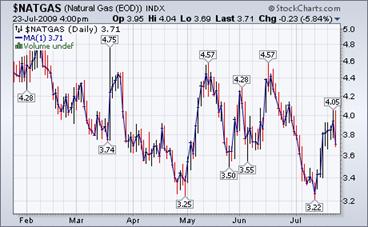 The Energy Information Agency’s Natural Gas Weekly Update reports, “Prices increased at nearly all market locations in the lower 48 States for the second consecutive week, interrupting a recent trend of declining spot prices. This week’s largest price gains occurred in the Rockies and California markets, as natural gas demand in the electric power sector grew to meet air-conditioning load. Prices in the eastern United States also increased, despite moderate temperatures. In addition, a number of firms have reported improved results in quarterly earnings reports, likely contributing to relative strength in natural gas prices.”
The Energy Information Agency’s Natural Gas Weekly Update reports, “Prices increased at nearly all market locations in the lower 48 States for the second consecutive week, interrupting a recent trend of declining spot prices. This week’s largest price gains occurred in the Rockies and California markets, as natural gas demand in the electric power sector grew to meet air-conditioning load. Prices in the eastern United States also increased, despite moderate temperatures. In addition, a number of firms have reported improved results in quarterly earnings reports, likely contributing to relative strength in natural gas prices.”
You saw it here first!
USPS May Be Unable to Make Payroll in October and Retiree Health Plan Costs, Unions' Letter to White House Says
July 19, 2009
On July 14, unions representing United States Postal Service (USPS) workers wrote the White House with "extreme urgency" asking for a meeting to address lack of funding for both employee payroll in October and health benefits for retired employees. The letter, which the FederalTimes.com blog provided a scanned copy late last week, says:
"[USPS] top executives are now saying that the USPS will default on a $5.4 billion payment to prefund future retiree health benefits on September 30, 2009. And its government affairs representative are now telling Congressional staff that the Postal Service may not be able to make payroll in October and will be forced to issue IOUs instead."
Our Investment Advisor Registration is on the Web
We are in the process of updating our website at www.thepracticalinvestor.com to have more information on our services. Log on and click on Advisor Registration to get more details.
If you are a client or wish to become one, please make an appointment to discuss our investment strategies by calling Connie or Tony at (517) 699-1554, ext 10 or 11. Or e-mail us at tpi@thepracticalinvestor.com .
Anthony M. Cherniawski,
President and CIO
http://www.thepracticalinvestor.com
As a State Registered Investment Advisor, The Practical Investor (TPI) manages private client investment portfolios using a proprietary investment strategy created by Chief Investment Officer Tony Cherniawski. Throughout 2000-01, when many investors felt the pain of double digit market losses, TPI successfully navigated the choppy investment waters, creating a profit for our private investment clients. With a focus on preserving assets and capitalizing on opportunities, TPI clients benefited greatly from the TPI strategies, allowing them to stay on track with their life goals
Disclaimer: The content in this article is written for educational and informational purposes only. There is no offer or recommendation to buy or sell any security and no information contained here should be interpreted or construed as investment advice. Do you own due diligence as the information in this article is the opinion of Anthony M. Cherniawski and subject to change without notice.
Anthony M. Cherniawski Archive |
© 2005-2022 http://www.MarketOracle.co.uk - The Market Oracle is a FREE Daily Financial Markets Analysis & Forecasting online publication.



